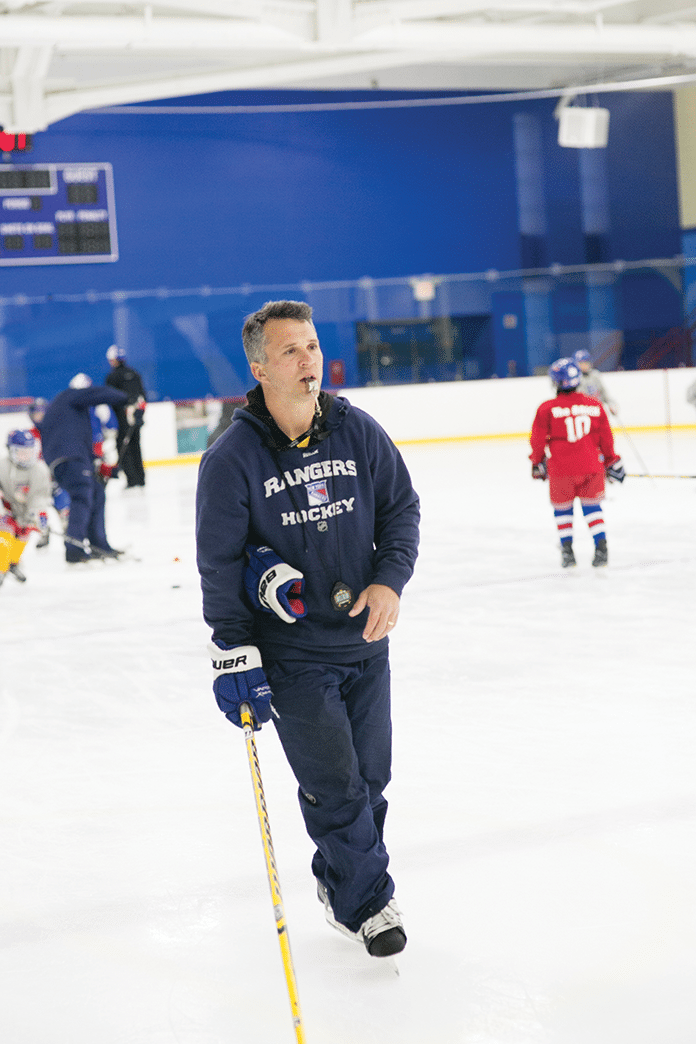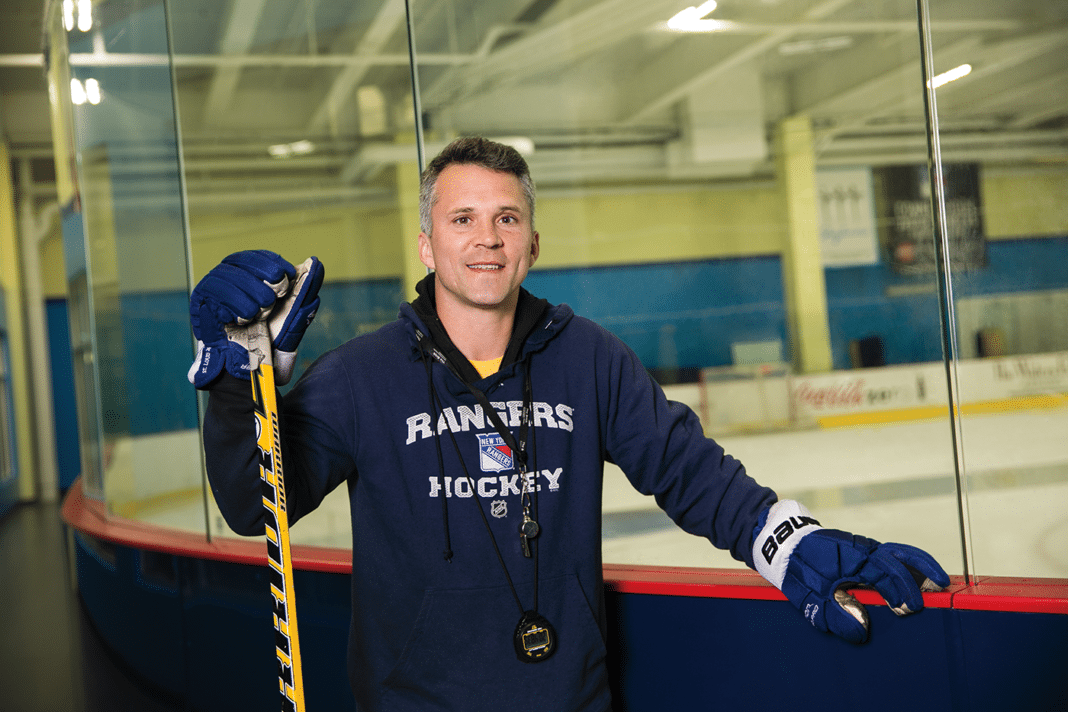Martin “Marty” St. Louis is only the sixth player in NHL history to play in 1,000 games and amass more than 1,000 points after going undrafted. At only 5’8″ and about 175 pounds, Marty St. Louis willed his way to NHL stardom through hard work and tenacity. Here, he speaks to producer Rob Burnett about that storied career, being a dad, and more.
Rob Burnett: Many people are aware of your tremendous success in hockey. You were the MVP of the NHL in 2004; won two scoring titles; played in six All-Star games, won an Olympic gold medal, hoisted the Stanley Cup in 2004, and, most recently, had your number 26 retired in Tampa Bay. But the road to the top was neither straight nor easy, was it?
Martin St. Louis: No, it really wasn’t. The early years were very challenging.
RB: Despite a stellar career as a young player in Canada, you went undrafted by the NHL. Was there a Plan B for you, or was it only ever about making it to the NHL?
MS: I had a plan from the very beginning in case hockey did not work out: college. You have to understand this was not the usual path for a kid growing up in Laval, Quebec. Normally, maybe you’d play junior hockey and if you didn’t make the NHL you learned a trade. My parents always wanted me to go to college, and we knew I needed to get a scholarship. That was just the reality. I always kept my goals short term: let’s see if hockey can get me to college.
RB: Even though the NHL wasn’t noticing you at that point, you did have a lot of colleges after you. What made you choose the University of Vermont? Was there something about that program that you thought would get you more noticed by NHL teams?
MS: I chose UVM for one simple reason: It was two hours from my house in Quebec.
RB: Really? That was it?
MS: My father was a postal worker. They couldn’t afford plane tickets and I knew he would drive 10 hours every weekend to see me play if he had to. I didn’t want him to have to do that. It turned out to be a great decision. UVM taught me so much about life outside of hockey.
RB: Do you remember an exact moment in your early days that made you start to think, “You know what, I may be good enough to play in the NHL?”
MS: It came in phases. I had a very strong freshman season at the University of Vermont. That made me think I could get to the next level. I didn’t know about the NHL, but I believed I could play hockey professionally somewhere.
Then after my junior season I played in a famous tournament in Switzerland called the Spengler Cup. It’s a very high level: Our team had a few top NCAA players, some members of Team Canada, and guys who had either just played in the NHL or who were on their way out. I was a kid playing against men. I played really well and my confidence exploded. I entered that tournament at 5’7” and came out at 5’11”.
RB: When you were finally brought up to the NHL with the Calgary Flames in 1998, things didn’t go well right away. You were released, and then eventually ended up in Tampa, where again you didn’t find instant success. Did you ever consider quitting?
MS: Never. Most people who don’t realize their dreams just quit too early.
RB: We all know how close you were with your mom before she passed away three years ago. When things weren’t going well did she gently try to get you to become more realistic about your NHL dreams?
MS: (chuckles) God, no. Not for a second. She would just say, “You’ll show ‘em Marty. You’ll show ‘em.”
RB: And you did, of course, clicking with Tampa Bay and then setting sail toward becoming one of the NHL’s all-time greats. It all comes back to a word that I think all of us parents want our kids to have: grit. You have three kids and you’re a coach. Where does grit come from? Is it something you can teach?
MS: I think it starts with passion. If you are not passionate, you’ll never find out how good you can be at something because you won’t work hard enough. There are people who could be great at something but never know because they don’t have the passion for it and then don’t put in the work. It isn’t about talent. It’s about work.
RB: I’m guessing Laval, Quebec, is different than Greenwich, CT. Do you think parents here make a mistake by doing too much for their kids?
MS: It’s tough for parents. We all want what’s best for our kids. Sometimes they feel discouraged and that’s a normal feeling. It’s an opportunity to see how they respond. It’s a chance for them to grow up. In a crisis, will I offer guidance? Of course. But I won’t try to solve their problems for them.
RB: I’m a hockey dad. What advice do you have for parents whose kids play competitive sports?
MS: First off, every parent thinks their kid is a little better than he or she actually is—
RB: Not me, my kid is amazing—
MS: (chuckles) Believe me, I know, because I’m the same way with my kids. On my team I tell the parents that my coaching style is the same as my parenting style. If they don’t like me as a parent, they won’t like me as a coach.

RB: What is that style?
MS: Tough, but fair. What gets frustrating is that a parent can undo everything you are doing with a kid in twenty seconds on the car ride home. And honestly, a lot of parents don’t really have the knowledge to know what a good play or a bad play is. So it gets confusing for the kid.
RB: When my son was nine and just starting to play hockey, he was on a travel team and wasn’t one of the better kids. The coaches would pull him off the ice in key situations, which I had no problem with, but I was curious how he felt about it.
One day in the car I gently asked him if it bothered him and he said, “Nah.” He couldn’t care less. I wasn’t sure how to feel about this. Later, I realized that I kind of wanted him to be bothered by it so I could then try to convince him not to be bothered by it. But he already wasn’t bothered by it! My point here is that parents are nuts.
MS: (chuckles) Everyone means well, but a lot of parents make the mistake of being day traders when it comes to their kids. They are riding every up and down. Kids will have good days and bad days—and not just in sports. They should be looked at as long-term bonds, not stocks that are going up and down every minute.
RB: Did you ever run into a situation in your career where you just couldn’t win over a particular coach? And if so, what did you do?
MS: I had all types of coaches. The older I got the more comfortable I felt approaching them, to sort through parts of my game. It’s important for the kids to communicate with the coaches, especially as they get older, and parents should encourage that. A coach will respect the kid more if it’s coming from him and not the parent.
One of my sons playing baseball really wanted to pitch and the coach wasn’t putting him in at pitcher. I told him, “If it’s important to you, go talk to the coach.” But I would never go to the coach myself and say, “Hey, my kid wants to pitch.”
RB: I tell a story about you that you don’t even know about.
MS: Yeah? What’s that?
RB: When you were on the Rangers, my son and I used to watch you at the end of every pregame practice that beautiful off-wing, drop-to-the-knee one-timer you used to do. And I’d say, “Look, Marty St. Louis is practicing his shot.” My son would say, “Yeah, but he’s warming up for the game.” Then, one day we happened to be driving past your house on the weekend and we see you drop to your knee, shooting pucks! My son looked at me and said, “Don’t even say it.” We went home and shot pucks in the driveway for two hours.
MS: Hahaha. That’s great.
RB: And now of course he’s on the Rangers, so thanks for that. Speaking of the Rangers, as a fan, I don’t think I have ever seen anything more emotional than when you came back days after your mom passed. In particular, Game Six back at Madison Square Garden when you scored against Pittsburgh. I was there, and the whole place was in tears.
MS: It was a special moment. It was Mother’s Day. My father and sister were there. I remember wanting to get the puck after the goal, and before I could go find it, it just came right to me by the bench. I looked down and it was just somehow coming right at my skate. I think there was definitely some help from above on that one.
RB: Let’s end with the most important question of the day. I kind of run a backyard hockey league. If I get you a fake nose and glasses, maybe a wig, will you come be on my team?
MS: (chuckles) Yeah, and based on what I’ve heard about the level of play, I think we’ll be all right.
RB: I guarantee you’d beat your Tampa Bay numbers.
Rob Burnett won 5 Emmy awards as executive producer for The Late Show with David Letterman. He is also co-creator of the critically acclaimed show Ed and most recently, writer/director of The Fundamentals of Caring, the closing film at the 2016 Sundance Film Festival.
Photos by Bruce Plotkin





